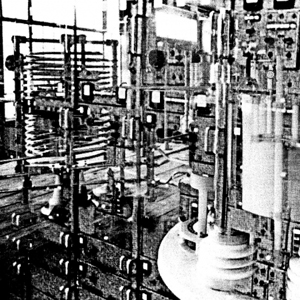Pariah Rift EP
Arthur Cayzer’s third single as Pariah is, without question, his most cryptic release to date. […]

Arthur Cayzer’s third single as Pariah is, without question, his most cryptic release to date. It’s a bit difficult at first to get a grip on what the London-based producer is angling for here. Several listens deep, however, the fog begins to dissipate, revealing a record that, while erratic, is a bold, newly darkened expansion of Cayzer’s previous aesthetic.
According to the label, these three tracks were originally constructed around samples of shortwave radio recordings. It’s hard to pinpoint where, exactly, these samples figure into the finished product (if they do at all), but Rift certainly has the spooky, disembodied feeling of a crackly foreign-language radio broadcast.
This is especially the case on the title track. It’s a major departure from his previous work, partly in terms of how it’s constructed, but especially in its eerie, borderline oppressive atmosphere. The spare, shuffling opening doesn’t build toward an obvious climax; instead, an eerie array of synths overtakes the track, guiding it into an unsettling and shadowy realm. Permeated with dread and paranoia, “Rift” cultivates a tense air not unlike the fever dream soundscapes of Demdike Stare, or, to reach a bit further back, Goblin’s soundtrack work for filmmaker Dario Argento.
“Signal Loss,” the second track, is similarly intriguing, moving at a similarly midtempo pace but working in a more longing mode. Here, Cayzer pairs a clipped male vocal sample with fragments of piano and what sounds like a children’s choir for a creepy, wistful effect, accentuating the crackling background noise and providing some relief from the (admittedly engaging) paranoia of the opening track.
As strong as the first two tracks are, the single’s closing track, “Among Those Metal Trees,” is an uneasy, unfortunately skip-worthy three minutes of hissing murk. Coming across as a stab at an elegiac ballad of some kind, it that doesn’t particularly add to the record. It’s easily forgivable, however, given the relative strength of the preceding tracks.
Rift ultimately feels like a transitional record. While not as immediately enchanting as the highlights of his previous work, it’s compelling in subtle, completely new ways, and reveals Cayzer as a multifaceted, adventurous producer.

